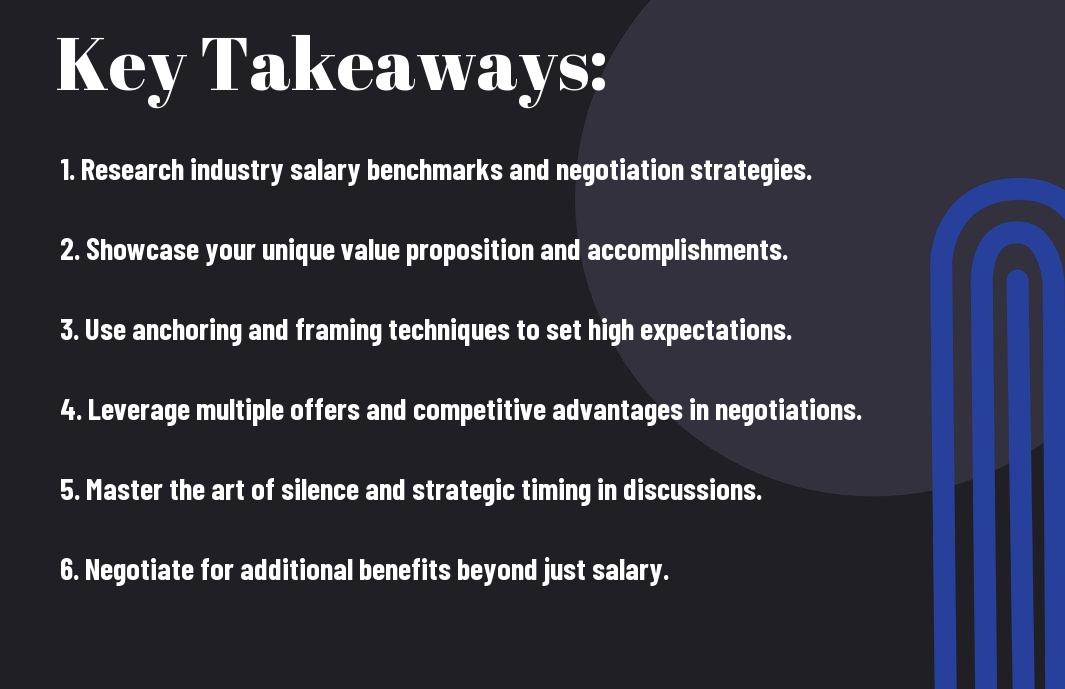Many professionals may find themselves in situations where they need to negotiate their compensation in order to secure top-dollar in their careers. As the job market continues to evolve, having advanced negotiation tactics can be crucial in achieving your desired salary and benefits. In this blog post, we will explore into key strategies and techniques that can help individuals confidently navigate salary negotiations and come out on top.
Key Takeaways:
- Prepare, Prepare, Prepare: Thoroughly research market rates, company financials, and your own value proposition before entering into negotiations.
- Anchor High: Start the negotiation with a bold and well-supported figure that establishes a higher range for the compensation package.
- Highlight Unique Value: Emphasize your unique skills, experience, and achievements that set you apart from other candidates and justify a higher salary.
- Utilize Multiple Offers: Leverage competing offers or potential opportunities to demonstrate your market value and negotiate a more lucrative compensation package.
- Stay Composed and Assertive: Maintain a confident and professional demeanor during negotiations, clearly articulating your worth while being open to compromise to reach a mutually beneficial agreement.

Understanding the Negotiation Process
Now, when it comes to negotiating for top-dollar compensation in your career, it is crucial to have a solid understanding of the negotiation process. Before venturing into negotiations, it’s crucial to familiarize yourself with key negotiation tactics and strategies. Reading resources like 15 Rules for Negotiating a Job Offer from Harvard Business Review can provide valuable insights to help you navigate the negotiation landscape effectively.
Key Phases of Negotiation
Understanding the key phases of negotiation is critical for achieving successful outcomes. It involves preparation, opening discussions, bargaining, and closing the deal. Each phase requires a different set of skills and strategies to maximize your chances of securing top-dollar compensation in your career. By mastering these phases, you can position yourself as a strong negotiator and advocate for your worth effectively.
The Role of Preparation and Information Gathering
Preparation is a fundamental aspect of negotiation that cannot be overlooked. Before entering any negotiation, it’s crucial to gather relevant information about industry standards, salary benchmarks, and the value you bring to the table. By coming prepared with data and facts to support your negotiation position, you can strengthen your arguments and increase your chances of securing top-dollar compensation. To enhance your preparation, consider conducting market research, seeking advice from industry experts, and practicing negotiation scenarios to build confidence in your abilities.
Developing a Negotiator’s Mindset
Some may view negotiation as a daunting task, filled with uncertainties and risks. However, to secure top-dollar compensation in your career, it is necessary to cultivate a negotiator’s mindset. This mindset involves being confident in your abilities, understanding your worth, and effectively communicating your value to potential employers or clients.
Overcoming Fear and Building Confidence
Fear can often hinder individuals from confidently negotiating for higher compensation. To overcome this fear, it is crucial to focus on your strengths, accomplishments, and the unique value you bring to the table. Building confidence starts with believing in yourself and your worth. Note, successful negotiation is not about being aggressive, but about advocating for what you deserve based on your skills and contributions.
Strategies for Assertive Communication
Confidence plays a significant role in negotiation, especially when it comes to assertive communication. This involves clearly articulating your needs and expectations while remaining respectful and open to compromise. Strategies for assertive communication include active listening, maintaining eye contact, and using confident body language to convey your message effectively. With these communication skills, you can confidently navigate negotiations and secure the compensation you deserve.

Crafting Your Value Proposition
Despite the competitive job market, there are negotiation strategies that can help you increase your income significantly. For more insights on this topic, check out Negotiation Strategies That Helped Increase My Salary by …
Articulating Your Unique Selling Points
Selling yourself effectively during salary negotiations involves clearly communicating your unique skills, experiences, and accomplishments that set you apart from other candidates. Emphasize how your qualifications directly align with the requirements of the position and showcase the value you bring to the organization. By highlighting your strengths and demonstrating how you can contribute to the company’s success, you can command a higher salary that reflects your worth.
Aligning Your Value with Organizational Goals
Value proposition should explain how your skills and expertise align with the company’s strategic objectives and contribute to achieving its goals. By demonstrating how your contributions can directly impact the organization’s bottom line or help in solving key challenges, you position yourself as a valuable asset worth investing in. Your ability to align your value with the company’s goals not only strengthens your negotiating position but also showcases your commitment to the organization’s success.
Strategic Approach to Negotiation
Once again, the art of negotiation plays a pivotal role in securing top-dollar compensation in your career. A strategic approach to negotiation involves careful planning, effective communication, and a deep understanding of your worth in the market. By utilizing advanced negotiation tactics, individuals can position themselves for success in salary discussions and ultimately achieve their desired compensation package.
Principled Negotiation Techniques
For individuals looking to secure top-dollar compensation, employing principled negotiation techniques can make a significant impact. This approach, popularized by negotiation experts, focuses on separating the people from the problem, focusing on interests rather than positions, generating options for mutual gain, and insisting on objective criteria. By incorporating these principles into negotiations, individuals can create a collaborative and value-driven process that leads to favorable outcomes.
Tactical Empathy and Influencing Decision Makers
Approach negotiations with a mindset of tactical empathy, understanding the emotions, motivations, and perspectives of the individuals you are negotiating with. By demonstrating empathy and actively listening to the concerns of decision-makers, you can build rapport, strengthen relationships, and ultimately influence their decisions in your favor. A study by Harvard Business Review found that negotiations led with empathy were more likely to result in successful outcomes, highlighting the importance of emotional intelligence in the negotiation process.
Influencing decision-makers requires a strategic approach that combines empathetic understanding with persuasive communication. By showcasing your value proposition, articulating your contributions, and aligning your interests with the goals of the organization, you can effectively sway decision-makers towards offering top-dollar compensation that reflects your worth in the market.
Non-Verbal Communication and Power Dynamics
Keep in mind that negotiations extend beyond just spoken words. Mastering body language and tone can significantly impact the outcome of any discussion. Your non-verbal cues convey confidence, or lack thereof, to the other party, influencing their perception of your worth. By maintaining strong eye contact, a firm handshake, and good posture, you can exude professionalism and assertiveness, ultimately strengthening your position in the negotiation.
Mastering Body Language and Tone
The way you carry yourself speaks volumes in negotiations. Ensure your body language reflects confidence and composure, as this can instill trust and respect in the other party. Additionally, pay attention to your tone of voice; speaking clearly and assertively can help you command attention and project authority.
Using Silence and Presence to Your Advantage
An often underrated tactic in negotiations is the strategic use of silence. By pausing before responding or simply maintaining a composed demeanor, you can create a sense of anticipation and control in the conversation. This approach can prompt the other party to fill the silence with concessions or reveal valuable information, giving you a tactical advantage.
Navigating Difficult Negotiations
Not every negotiation will be smooth sailing, and it’s crucial to be prepared for challenging situations. When faced with a tough negotiation, it’s important to remain composed and focused on your end goal. Advanced negotiation skills, like those taught by Gerta Malaj in her course on Advanced Negotiation Skills for the Workplace, can provide you with the tools and strategies needed to navigate through difficult negotiations successfully.
Dealing with Counteroffers and Rejections
Negotiations can become especially tricky when counteroffers or rejections are brought to the table. In such situations, it’s vital to stay calm and maintain a solution-oriented approach. Remember to thoroughly assess the reasons behind the counteroffer or rejection and adapt your negotiation strategy accordingly. By employing advanced negotiation tactics such as active listening, empathy, and value creation, you can effectively address counteroffers and rejections while steering the negotiation towards a mutually beneficial outcome.
Anticipating and Overcoming Objections
With negotiations, it’s crucial to anticipate potential objections that may arise during the process. Proactively identifying and preparing for objections can help you maintain control of the negotiation and effectively address any concerns raised by the other party. By utilizing techniques like pre-framing, reframing objections as opportunities, and highlighting the value proposition of your proposal, you can overcome objections with confidence and move the negotiation forward towards a successful resolution.
Plus, by leveraging your understanding of common objections and employing advanced negotiation skills, you can demonstrate your expertise and credibility as a strategic negotiator. This not only positions you for success in the current negotiation but also sets the stage for future negotiations, ultimately helping you secure top-dollar compensation in your career.
Long-Term Negotiation Strategies
Unlike short-term negotiation tactics, long-term strategies focus on building lasting relationships that can benefit you in future negotiations. Building strong relationships with key decision-makers within your industry can significantly improve your negotiating power and help you secure top-dollar compensation in your career.
Building Relationships for Future Negotiations
Negotiation is not just about the current deal on the table – it’s about setting yourself up for success in future negotiations as well. Take the time to network with industry professionals, attend conferences and events, and stay connected with colleagues and mentors. Building these relationships can open doors to new opportunities and give you a competitive edge when it comes to negotiating your compensation.
Evaluating and Renegotiating Offers Over Time
An necessary part of long-term negotiation strategies is the ability to evaluate and renegotiate your compensation over time. As you gain more experience and expertise in your field, your value as an employee increases. It’s important to regularly assess your current compensation package and determine if it aligns with your market value. If not, don’t be afraid to initiate conversations with your employer about a potential renegotiation to ensure you are being properly compensated for your skills and contributions.
Long-term negotiation strategies require patience, persistence, and a proactive approach to managing your career and compensation. By implementing these tactics, you can position yourself for continued success and secure top-dollar compensation in your career.
Legal and Ethical Considerations
Understanding Contractual Obligations
One key aspect of negotiating top-dollar compensation in your career is understanding your contractual obligations. Before entering into negotiations, make sure you are aware of any existing agreements or contracts that may impact your ability to negotiate. This includes non-compete clauses, confidentiality agreements, and any other contractual obligations that could potentially limit your bargaining power. By understanding these obligations upfront, you can strategize how to navigate them during the negotiation process effectively.
Navigating Ethical Dilemmas in Negotiations
To ensure a successful negotiation process, it’s necessary to navigate any ethical dilemmas that may arise. Ethical considerations are crucial in maintaining trust and integrity throughout the negotiation process. One common ethical dilemma is the balance between advocating for your own interests and being fair and transparent with the other party. It’s important to approach negotiations with honesty and integrity to build a strong foundation for a mutually beneficial outcome.
It is imperative to prioritize transparency and open communication during negotiations to uphold ethical standards. By conducting yourself with integrity and adhering to ethical guidelines, you can build trust with the other party and increase the likelihood of a successful negotiation outcome.
Role-Playing and Simulation Exercises
Enhancing Skills through Practice
Many individuals underestimate the power of role-playing and simulation exercises in preparing for negotiations. These exercises provide a safe space to practice different scenarios, fine-tune communication skills, and experiment with various negotiation strategies. By immersing yourself in simulated negotiations, you can build confidence, develop adaptive thinking, and improve your ability to navigate complex bargaining situations. As the saying goes, practice makes perfect – and in negotiation, practice can lead to securing top-dollar compensation in your career.
Analyzing and Learning from Simulation Feedback
An necessary aspect of engaging in role-playing and simulation exercises is the opportunity to receive feedback and analyze your performance. By reflecting on the outcomes of these exercises, you can identify areas for improvement, recognize effective tactics, and learn from your mistakes. This process of self-assessment and reflection is crucial in refining your negotiation skills and honing your ability to secure favorable outcomes. Additionally, seeking feedback from peers or mentors can provide valuable insights and perspectives to further enhance your negotiation prowess.
To truly capitalize on the benefits of simulation exercises, it is necessary to approach feedback with an open mind and a willingness to learn and adapt. Constructive criticism and insights from others can offer valuable perspectives that may not have been apparent during the negotiation simulation. By embracing feedback as a tool for growth and development, you can optimize your negotiation skills and increase your chances of successfully securing top-dollar compensation in your career.

Harnessing the Power of Networking
Expanding Your Influence through Professional Networks
For professionals seeking to secure top-dollar compensation in their careers, networking plays a crucial role in opening doors to new opportunities and connections. By actively engaging with industry peers, attending networking events, and utilizing online platforms such as LinkedIn, you can expand your influence and increase your visibility within your field. Building strong relationships with key players in your industry can provide valuable insights into market trends, potential job openings, and salary benchmarks, giving you a competitive edge in negotiation scenarios.
Utilizing Mentors and Sponsors in Negotiation Scenarios
Harnessing the guidance and support of mentors and sponsors can greatly enhance your negotiation abilities and help you achieve top-dollar compensation. Mentors provide valuable advice, share their own experiences, and offer constructive feedback to help you navigate complex negotiation situations. Sponsors, on the other hand, can actively advocate for your career advancement, open doors to new opportunities, and vouch for your professional capabilities in high-stakes negotiations. Research shows that individuals with mentors and sponsors are more likely to receive promotions and salary increases, underscoring the importance of leveraging these relationships in negotiation scenarios.
Scenarios where mentors or sponsors can provide insights into company culture, salary negotiation strategies, and industry norms can be invaluable in helping you secure the best possible compensation package for your skills and expertise.
Leveraging Technology in Negotiations
Virtual Negotiation Advantages and Challenges
All negotiations have now moved to virtual platforms, offering both advantages and challenges for individuals aiming to secure top-dollar compensation in their careers. Virtual negotiations provide flexibility in scheduling, eliminate the need for travel, and allow for easier access to decision-makers. However, challenges such as potential technology glitches, difficulties in reading body language, and the lack of personal connection can impact the negotiation process.
Utilizing Data Analytics to Support Negotiation Positions
Data analytics play a crucial role in strengthening negotiation positions and securing the best possible outcome. By analyzing market trends, industry data, and competitor information, individuals can gain valuable insights to support their negotiation strategies. Understanding the data behind salary benchmarks and industry standards can help individuals confidently negotiate for top-dollar compensation.
For example, individuals can use tools like salary comparison websites and industry reports to gather data on average salaries for their position and location. By leveraging this data, individuals can confidently negotiate for compensation that aligns with industry standards and their level of experience and expertise.

Final Words
Hence, mastering advanced negotiation tactics is crucial for those looking to secure top-dollar compensation in their careers. By implementing strategies such as anchoring, creating value, and using leverage effectively, individuals can confidently navigate salary discussions and ensure they are being adequately compensated for their skills and contributions.
Be mindful of, negotiation is an art form that requires practice and skill. By honing your abilities in this area, you can position yourself as a valuable asset in the job market and command the compensation you deserve. With dedication and persistence, you can effectively advocate for your worth and secure top-dollar compensation in your career.




